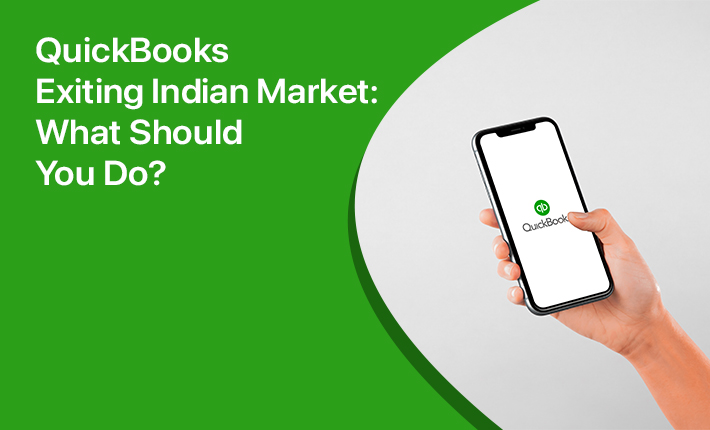How would you react if the most critical piece of software you depend on to run your company abruptly announced that it would no longer be available to you? When Intuit QuickBooks announced that their India operation would close, this transpired. Many were shocked by this decision and curious about why Quickbooks left India.
After ten years of business, Intuit recently announced that QuickBooks would cease operations in India on January 31, 2023. In light of customer feedback and requests, this date was changed to April 2023 to coincide with the end of the fiscal year 2022–2023.
QuickBooks Decision to Leave the Indian Market
Why is QuickBooks leaving India?
They had access to a firm brand name, a brilliant team, almost unlimited funding, industry knowledge, and many other advantages that business owners would kill for. What went wrong, then? Why didn't Quickbooks function in India?
Small business owners can organise their accounting and business data using various financial and business management software. To meet this need, reputable accounting software providers like Tally, Zoho, and ProfitBooks are available on the market. However, Intuit QuickBooks is one of the most sought-after options in this area. NetSuite vs. QuickBooks competition has also dragged its market aside.
QuickBooks Online, QuickBooks Online Accountant, QuickBooks Time, and the QuickBooks mobile apps are no longer available for new subscriptions in India. Business owners who relied on Intuit to handle their daily financial management were shocked by this.
Reasons for QuickBooks Exit from India
1. High Competition From the Regional Players
Numerous factors could have prevented QuickBooks from operating in India. The fact that Intuit was having trouble competing with other accounting software solutions in the fiercely competitive Indian market could be one cause.
Numerous local businesses have offline-only versions of their software and offer it at a lower cost than QuickBooks. Over time, some domestic accounting software suppliers have appeared on the market, particularly following the implementation of GST. These homegrown businesses might have benefited from marketing by the Indian government's Atma Nirbhar Bharat project.
2. They Favoured Concentrating on Other Markets
Another cause might be that Intuit is focusing its resources in other directions. The company may be departing India to focus on other regions where the business will be more profitable.
3. They Were Unable to Comprehend Indian SMEs.
Despite this industry's advantages, some challenges may take time to overcome. Given the diversity of SMEs, which might range from tiny neighbourhood grocery stores to significant suppliers, a one-size-fits-all strategy could be more practical. SME-focused players must thoroughly understand the problems and the need to offer appropriate solutions.
When QuickBooks first debuted in India, numerous India-specific procedures, including registering TDS, were absent. I have first-hand knowledge of the difficulties encountered by the Indian market because of my work at ProfitBooks. Indian business owners are extraordinarily picky and cost-conscious. Before making a purchase, people need to talk to someone and require continual support.
5. Accountant’s Usually Prefer to Tally
Every accountant in India has done a Tally certification course after graduating. Tally’s popularity in the CA fraternity is unparalleled.
6. Technology Readiness of the Indian Market
Even with good internet penetration and digitisation, we Indians have still not warmed up to SaaS products. Indian business owners are still uncomfortable paying for a software subscription using a credit card. Then most of the banks in India still don’t offer APIs for transaction feed. Some payment gateways and Neo Banks are trying to bridge this gap, but it’s still a long way to go.
What Should the Existing QuickBooks Do?
With QuickBooks exiting India, what should you do if you are a QuickBooks user? Accounting data migration is a complex and essential task, and you cannot afford any mistakes in your accounting data. Some professionals can help migrate and implement better accounting software for businesses. In comparison with other NetSuite vs. QuickBooks.These professionals can help you choose better alternative accounting software.
Although QuickBooks has many advantages, such as market dominance, usability, and scalability, small-business owners may consider alternatives depending on their budget and the required features. NetSuite is a better choice than QuickBooks.
What is The Best Alternative for QuickBooks?
QuickBooks currently holds the title of best accounting software. Make sure your data isn't "trapped" if you decide against it before making a decision. Significantly, if your needs change as your business expands, you want to move data in and out of solutions quickly.
We must find QuickBooks alternatives in India and migrate the essential data. Here are the top QuickBooks substitutes and why a small-business owner should pick them.
1. Xero
Small business owners appreciate that Xero is straightforward and free of accounting lingo. Just plain language that makes it straightforward to decide what to do with your transactions, no debits or credits here. Additionally, the application provides several fundamental accounting capabilities such as QuickBooks Online, such as bank feeds, logical bank reconciliation, and precise inventory tracking and reporting.
2. Sage
Sage is a comprehensive accounting suite that provides desktop and cloud-based tools. For self-employed individuals and micro businesses is cost-effective. The latter grants access to limitless collaboration, quotations and estimates, cash flow forecasting, and purchase invoice management.
POS connectors, e-commerce capabilities, sales and marketing tools, and HR applications are also offered. Like Intuit, the company behind QuickBooks, Sage offers a wide range of solutions to assist you in growing your company, including an accountant partner programme and a dedicated calendar of conferences.
3. FreshBooks
With FreshBooks, you can track your spending, generate reports, invoice and collect client payments, and track sales tax. To assist you in creating a solution that is unique to your company, it also integrates with several other apps.
You shouldn't be concerned about running into a software problem and slamming through numerous web FAQs to figure it out. Excellent customer service representatives at FreshBooks rapidly address your queries, frequently responding to emails within 90 minutes and phone calls within three rings.
4. Wave Accounting
You can connect your business bank account to Wave Accounting, free accounting software, to have your bookkeeping data show automatically. The solution comes with several tools, including connections provided by Zapier, receipt scanning, unlimited collaborators, accounting reports, and invoicing.
But remember that extra fees apply to features like sending and receiving payments and managing payroll. As a result, we are unable to suggest Wave for giant teams. However, Wave is the best option if you need a free and straightforward accounting solution.
5. Zoho Books
The Zoho One suite of services, which includes over forty separate business apps, such as customer relationship management, HR tools, and reporting choices, includes Zoho Books as one of its products. The four plans offered by Zoho Books differ in terms of features, users, and workflows. Initially, Zoho provided a free plan.
Invoicing, estimates, the ability to link your bank accounts, reporting tools, a client portal, the ability to link with any of Zoho's other software, and third-party tools like Zapier and a Stripe integration are features you'll get regardless of your subscription.
6. Bonsai
The following product on our list of QuickBooks alternatives is Bonsai, an all-in-one software suite with some handy accounting tools for independent contractors. By defining an expense, associating it with a project, and including those charges in an invoice, Bonsai allows you to keep track of your billable expenses.
To import your spending, you can also link your bank account. Additionally, Bonsai offers analytics and expense reports so you may track your company's spending over time. You can set up recurring payments using Bonsai and get paid with a credit card, an ACH transfer, PayPal, or even bitcoin.
A freelance tax calculator, reporting features, time tracking, and the option to design unique client proposals and contracts are different tools. Clients and projects are also unlimited. With the more expensive plan, you can access services like the client portal, subcontracting, priority assistance, workflow automation, and client questionnaires.
7. FreeAgent
The accounting programme FreeAgent was created primarily for proprietors of small businesses. India's market for accounting software is expanding daily and becoming increasingly cutthroat. Customers benefit most from a competitive market because they get the most value for their money, and service providers are constantly improving their offerings and user experiences.
A small business owners would be extra cautious when selecting their accounting software now that QuickBooks has left the Indian market. With QuickBooks' departure, users now have to discover the best options for their company's accounting requirements, making it easier for competitors to win over new clients. Since the introduction of the GST, Zoho has concentrated on the Indian market and is well-known among Indian SMEs.
As part of the transition, all paid subscriptions will be switched to free before 31 July 2022 to enable companies to continue using QuickBooks until 31 January 2023 with no charges applied. Customers that purchased an annual subscription will be refunded for the time that was not used.
The firm, however, said this would not impact Intuit’s presence in India, where it has over 1,300 employees. In the near term, this could be an advantage for local rivals such as Zoho, Tally and Indiamart. Industry officials estimate that around 30,000 businesses use the Quickbooks product in India.















Post Comments